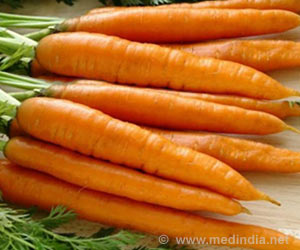Study provides the first experimental evidence of the effect of beta-carotene's on attractiveness and health.

- Many studies in the past have shown that females from different species are more attracted to colorful male counterparts.
- New study shows that beta-carotene is responsible for the enhanced attractiveness and appearance of skin.
- But the study also warns that skin coloring due to beta-carotene does not signal actual good health.
TOP INSIGHT
Carotenoid-based skin color can affect attractiveness in humans and this is a factor for sexual selection.
Researchers have argued that carotenoid-based coloration is a signal of health which is due to its antioxidant effect.
Previous research has found that in various species of birds, fish, and reptiles, females are more attracted to their colorful male counterpart.
Some studies suggest that the desire to reproduce, is what attracts people to signs of health in a desire to reproduce. Studies also suggest that those who display signs of health have a greater chance of survival, greater fertility, and providing genes that promote good health in offspring.
Effects of Beta-Carotene Supplementation
The treatment group of participants included 43 heterosexual Caucasian men with a mean age of 21 years. There was were a placebo group with an additional 20 participants.
The health of the participants were assessed by their levels of oxidative stress, immune function, and semen quality.
The, the participants in the treatment group were given a 12-week supplementation of beta-carotene and those in the placebo group received "dummy pills".
After the 12 week period, photography and health tests were repeated.
The attractiveness of the pre- and post-supplementation faces of each male participant presented side by side on a computer screen, were assessed by 66 heterosexual Caucasian female raters with a mean age of 33 years.
Results found that:
- beta-carotene supplements increased overall yellowness and redness but not lightness
- post supplement faces were 50% more likely to be chosen as attractive as well as healthier looking compared to the pre-photographs or the placebo group
The findings suggest that the participants' attractiveness and appearance of health were significantly enhanced by beta-carotene supplement, but the supplementation did not significantly affect any health functions.
The study concludes that carotenoid-based skin color may be sexually selected in humans, but there is no evidence to suggest that this is an honest signal of health.
Further research is needed to understand the influence of carotenoid coloration on mammals.
Yong Zhi Foo, author and postgraduate Animal Biology student at The University of Western Australia, says "Carotenoids are known to be responsible for the striking mating displays in many animal species. Our study is one of the first to causally demonstrate that carotenoids can affect attractiveness in humans as well. It also reaffirms the results of previous studies showing that what we eat can affect how we look".
The findings are published in the journal Behavioral Ecology.
Reference
- Yong Zhi Foo et al. The carotenoid beta-carotene enhances facial color, attractiveness and perceived health, but not actual health, in humans. Behavioral Ecology; (2017)
Source-Medindia
 MEDINDIA
MEDINDIA




 Email
Email










